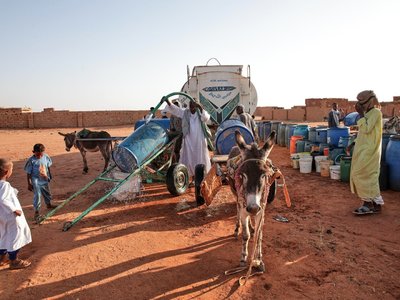Lancet Study Reveals Underestimation of Gaza War Death Toll by 40 Percent
Research indicates discrepancies in reported fatalities, highlighting significant humanitarian impact.
Research published in The Lancet medical journal on Friday has estimated that the death toll in Gaza during the first nine months of the ongoing Israel-Hamas conflict may be around 40 percent higher than figures recorded by Gaza's health ministry.
This new development adds complexity to the ongoing debate over casualty figures in a highly contentious and politically charged region.
The study, led by a UK-based group of researchers, utilized multiple data sources, including official health ministry records, online surveys, and social media obituaries, to gauge the extent of the human cost in the Palestinian territory.
The health ministry in Hamas-controlled Gaza had originally reported 37,877 deaths by June 30 last year.
However, the researchers' best estimate places this figure at approximately 64,260, suggesting a substantial underreporting of fatalities.
These deaths, which the study stresses stem from traumatic injuries, account for 2.9 percent of Gaza's pre-war population, equivalent to around one in 35 inhabitants.
Notably, 59 percent of the victims were women, children, and the elderly, underscoring the widespread and indiscriminate nature of the violence.
It's crucial to acknowledge that this figure does not include those who may have died due to a lack of healthcare, insufficient food, or the thousands considered missing and presumed buried under rubble.
This omission marks significant gaps in data, given the severe conditions on the ground, as noted by humanitarian organizations.
On the broader international front, figures surrounding the conflict have been a point of contention, with Israel questioning the credibility of Gaza's health ministry data even as the United Nations considers them reliable.
This latest study employs the 'capture-recapture' statistical method, a technique historically used in estimating death tolls in global conflicts, from Guatemala to Kosovo, providing a 'best estimate' amid the complexity of incomplete data.
Yet, the understandings gleaned must be contextualized within the inherent uncertainties of such estimates, as discussed by statistician Patrick Ball and Kevin McConway, a professor of applied statistics.
While these analyses strive for accuracy, the limitations stem from potential duplication and classification challenges.
Furthermore, indirect consequences of the war, such as infrastructure destruction that compromises healthcare, creates food shortages, and accelerates disease spread, remain unquantified in this assessment.
Previous estimates have suggested a substantially higher ultimate death toll when such factors are considered, though methodologies and assumptions vary.
This study has sparked discussions within the broader academic and policy-making communities regarding the representation and use of statistical data in conflict zones.
The lead author, Zeina Jamaluddine, stresses moving beyond an 'obsession' with toll disputations to address the underlying humanitarian crises, affirming the tragic high mortality known to all sides.
The critical takeaway underscores both a need for accurate reporting and effectively addressing the underlying factors contributing to prolonged human suffering in war-torn regions like Gaza.
This new development adds complexity to the ongoing debate over casualty figures in a highly contentious and politically charged region.
The study, led by a UK-based group of researchers, utilized multiple data sources, including official health ministry records, online surveys, and social media obituaries, to gauge the extent of the human cost in the Palestinian territory.
The health ministry in Hamas-controlled Gaza had originally reported 37,877 deaths by June 30 last year.
However, the researchers' best estimate places this figure at approximately 64,260, suggesting a substantial underreporting of fatalities.
These deaths, which the study stresses stem from traumatic injuries, account for 2.9 percent of Gaza's pre-war population, equivalent to around one in 35 inhabitants.
Notably, 59 percent of the victims were women, children, and the elderly, underscoring the widespread and indiscriminate nature of the violence.
It's crucial to acknowledge that this figure does not include those who may have died due to a lack of healthcare, insufficient food, or the thousands considered missing and presumed buried under rubble.
This omission marks significant gaps in data, given the severe conditions on the ground, as noted by humanitarian organizations.
On the broader international front, figures surrounding the conflict have been a point of contention, with Israel questioning the credibility of Gaza's health ministry data even as the United Nations considers them reliable.
This latest study employs the 'capture-recapture' statistical method, a technique historically used in estimating death tolls in global conflicts, from Guatemala to Kosovo, providing a 'best estimate' amid the complexity of incomplete data.
Yet, the understandings gleaned must be contextualized within the inherent uncertainties of such estimates, as discussed by statistician Patrick Ball and Kevin McConway, a professor of applied statistics.
While these analyses strive for accuracy, the limitations stem from potential duplication and classification challenges.
Furthermore, indirect consequences of the war, such as infrastructure destruction that compromises healthcare, creates food shortages, and accelerates disease spread, remain unquantified in this assessment.
Previous estimates have suggested a substantially higher ultimate death toll when such factors are considered, though methodologies and assumptions vary.
This study has sparked discussions within the broader academic and policy-making communities regarding the representation and use of statistical data in conflict zones.
The lead author, Zeina Jamaluddine, stresses moving beyond an 'obsession' with toll disputations to address the underlying humanitarian crises, affirming the tragic high mortality known to all sides.
The critical takeaway underscores both a need for accurate reporting and effectively addressing the underlying factors contributing to prolonged human suffering in war-torn regions like Gaza.











